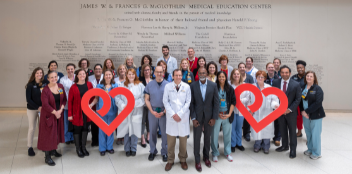Search for COVID-19 therapies includes VCU Medical Center canakinumab clinical trial
Preliminary data from a clinical trial testing the safety and efficacy of the drug canakinumab in treating COVID-19 patients should be available this fall.
VCU Medical Center enrolled 51 patients into the trial to learn whether the drug is effective against a severe inflammatory overreaction called cytokine release syndrome that may occur in some patients with pneumonia due to COVID-19.
Canakinumab works to neutralize a protein, Interleukin-1β, in the body to suppress deregulated inflammation. It is FDA approved to treat a series of rare auto-inflammatory diseases and a type of juvenile arthritis.

“Interleukin-1β is an important cytokine that mediates fever and causes a cascade of inflammation in the body and is considered to be one of the key mediators in inflammatory response,” said Dr. Antonio Abbate, the James C. Roberts Esq. Professor of Cardiology in the Division of Cardiology
and the study’s principal investigator.
Canakinumab was selected for the trial because of its strong cardiovascular safety profile, he noted.
The international study activated at VCU Health on April 29 and is sponsored by drug manufacturer Novartis.
In this phase 3, randomized, placebo-controlled trial, researchers enrolled volunteer COVID-19 patients who were experiencing severe COVID-19 pneumonia and who required oxygen but not a ventilator.
VCU Medical Center was involved in a previous study of canakinumab where it was shown to reduce recurrent cardiovascular events.
As VCU and hospitals worldwide work to combat the coronavirus from a number of angles, Abbate and Dr. Benjamin Van Tassell, professor in VCU’s School of Pharmacy and a co-investigator on the study, are also interested in impeding the symptoms’ progression from moderate to severe to fatal. And the inflammation, Van Tassell said, may be what’s actually fatal.
Canakinumab was selected for the clinical trial because of its strong cardiovascular safety profile.
“It can kind of snowball on itself,” he said. “A little bit of inflammation can trigger more inflammation, which triggers more and more. And that seems to be the most dangerous part of a COVID-19 infection: when you enter into this hyper-inflammatory state.”
“We know that while the COVID-19 virus may be affecting people of all ages and diseases, it seems to be more severe in older patients and patients with comorbidities like heart disease, diabetes and obesity,” Abbate added. “These patients have chronic inflammatory state at baseline.”
Few studies have specifically looked at COVID-19’s effect on the heart, and none have looked at treatments for cardiac complications at this time, Abbate noted. For such a study to occur, patients would have had to have heart-related complications first and then enroll in a treatment study. But because individuals are being offered treatment studies when they present with COVID-19, there have been no studies looking specifically at patients who have cardiac complications. What we may expect is that some treatments may reduce the incidence (occurrence) of such complications.
The canakinumab study follows other drug treatment trials at VCU Medical Center, including two trials with an antiviral drug developed for Ebola, remdesivir, and another with a drug developed to treat rheumatoid arthritis, sarilumab. Abbate said the sarilumab did not show any clinical benefit in that specific trial; however, the full results have not been published. Results of several clinical trials for patients with severe COVID-19 symptoms, including a trial at VCU Medical Center, showed that remdesivir was effective in reducing the length and severity of COVID-19-related pneumonia. The FDA issued an emergency use authorization for remdesivir May 1 based on data from 180 clinical sites, including VCU Medical Center. Abbate points out that with over 1,000 clinical trials on COVID-19 ongoing worldwide, it will be important to stay updated on all the latest evidence in real time.
There is a lot still unknown about COVID-19 and its symptoms. “It’s clear that at different stages of the disease, you’re trying to prevent different complications,” he said.
Abbate is also the medical director of the Clinical Research Unit at VCU Health and an associate director at the C. Kenneth and Dianne Wright Center for Clinical and Translational Research, which oversees clinical trials at VCU with the help of a National Institutes of Health award. The Clinical Research Unit is a unique, dedicated space at VCU Health used for clinical trials, and its committed staff of nurses has been heavily involved in COVID-19 trials.
“With all of the moving pieces in the COVID-19 pandemic, it has really helped to be at a place like VCU that has the experience, the infrastructure, the personnel and the will to do this kind of trial,” Van Tassell said.
Back to Autumn-2020
Join our Pauley Consortium composed of patients, friends and advocates.

